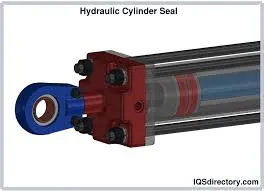Nov . 14, 2024 16:26 Back to list
hydraulic oil cylinder product
Understanding Hydraulic Oil Cylinders A Comprehensive Overview
Hydraulic oil cylinders are pivotal components in a wide range of industries, offering significant advantages in terms of force multiplication and precise control of movements. These cylinders operate based on the principles of hydraulics, which involve using pressurized liquid to generate mechanical power. In this article, we will delve into the fundamental aspects of hydraulic oil cylinders, their applications, advantages, maintenance, and the future of hydraulic technology.
What is a Hydraulic Oil Cylinder?
A hydraulic oil cylinder is essentially a linear actuator that converts hydraulic energy into mechanical energy. It consists of a cylindrical barrel, a piston, and two end caps. When hydraulic fluid is pumped into the cylinder, it creates pressure that pushes the piston, resulting in linear motion. This motion can then be used to perform various tasks, such as lifting heavy loads, pushing components, or even moving machinery.
Key Components of a Hydraulic Oil Cylinder
1. Cylinder Barrel The main body that houses the hydraulic fluid and provides structural integrity. 2. Piston The moving element within the cylinder that converts hydraulic pressure into mechanical force. 3. Seals Essential for preventing leaks and ensuring the cylinder operates effectively under high pressure. 4. End Caps These close the cylinder and often contain ports through which the hydraulic fluid enters and exits.
Applications of Hydraulic Oil Cylinders
Hydraulic oil cylinders are versatile and are employed in various sectors, including
- Construction Used in excavators, bulldozers, and cranes to lift, push, and pull heavy materials. - Manufacturing Utilized in presses and automation equipment to streamline production processes. - Transportation Found in vehicles like forklifts and trailers to facilitate lifting and transporting loads. - Aerospace Employed in flight control systems to manage the movement of various components. - Marine Used in shipbuilding and repair, as well as in the operation of heavy equipment on ships.
Advantages of Hydraulic Oil Cylinders
hydraulic oil cylinder product

1. High Force Output Hydraulic systems can generate a remarkable amount of force relative to their size, enabling operators to move heavy objects with minimal physical effort. 2. Precision Control Users can easily control the speed and position of the cylinder, enhancing the accuracy of operations. 3. Durability Hydraulic cylinders are designed to withstand harsh conditions, making them suitable for heavy-duty applications. 4. Energy Efficiency When properly designed, hydraulic systems tend to be more energy-efficient compared to mechanical systems, particularly for large-scale operations.
Maintenance of Hydraulic Oil Cylinders
To ensure optimal performance and longevity, regular maintenance of hydraulic oil cylinders is essential. Key maintenance practices include
- Regular Inspection Check for any signs of wear, leakage, or damage to seals and components. - Fluid Levels Ensure the hydraulic fluid is at the appropriate levels and is free of contamination. - Seal Replacement Replace seals periodically to prevent leaks, which can compromise efficiency and safety. - Cleanliness Maintain cleanliness in hydraulic systems to prevent contamination that could lead to premature failure.
The Future of Hydraulic Technology
As industries continue to evolve, so does hydraulic technology. Innovations such as smart hydraulics, which involve sensors and IoT technology, are being integrated into hydraulic systems. These advancements are expected to provide more accurate data, enhance control, and improve the efficiency of hydraulic operations.
In addition, the move towards sustainability is prompting the development of eco-friendly hydraulic fluids and energy-efficient hydraulic systems. As industries seek to reduce their carbon footprint, hydraulic technology will likely adapt to meet these environmental challenges.
Conclusion
Hydraulic oil cylinders are vital components that play a crucial role in modern mechanical systems across various industries. Their ability to convert hydraulic energy into precise mechanical movements makes them indispensable for tasks requiring significant force. By understanding the components, applications, advantages, and maintenance practices associated with these cylinders, users can optimize their use and ensure longevity and efficiency. As technology advances, the future of hydraulic systems looks promising, with innovations poised to enhance their capabilities and applications further.
-
Fork Lift Power Units - Hebei Shenghan | Efficiency, Reliability
NewsJul.13,2025
-
1.5-Ton Turbocharged Cylinder-Hebei Shenghan|Hydraulic Solution,Energy Efficiency
NewsJul.13,2025
-
Auto Hoist Power Units-Hebei Shenghan|Efficiency&Industrial Lifting
NewsJul.13,2025
-
Double Acting Power Units-Hebei Shenghan|Hydraulic Solutions,Industrial Efficiency
NewsJul.13,2025
-
1.5 Ton Lifting Cylinder 70/82-40-290-535 - High-Performance Hydraulic Solution | Hebei Shenghan
NewsJul.13,2025
-
Fork Lift Power Units - Hebei Shenghan | Efficiency&Reliability
NewsJul.13,2025
